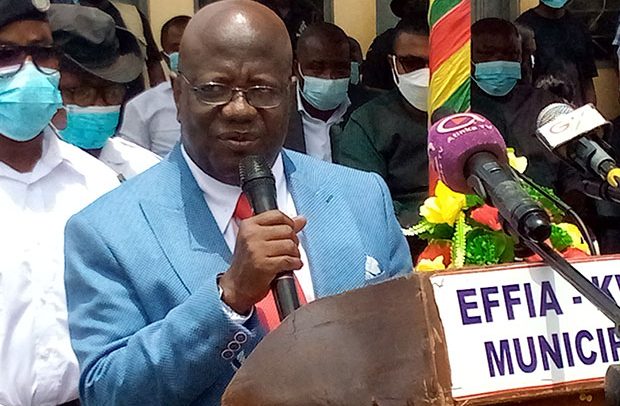EKMA MCE, Kojo Acquah
The Effia-Kwesimintsim Municipal Assembly (EKMA) in the Western Region has cautioned landlords and property owners in the municipality who are without toilet facilities to ensure they construct some for their tenants.
This is part of efforts by the assembly to help promote good health and prevent open defecation and its associated diseases.
To this end, about 120 landlords and caretakers in the area without toilets have been served with notices to provide suitable toilet facilities in their houses within six months.
According to the assembly, after the six months grace period, defaulters would be prosecuted at the law court.
The Municipal Chief Executive (MCE), Kojo Acquah disclosed this at the assembly’s third ordinary meeting of the second session yesterday.
He also revealed that the assembly has had discussions with informal waste collectors in the area on the need to properly manage and dispose of refuse.
He said the assembly has banned the use of tricycles, popularly known as ‘Pragya’ in the municipality.
He bemoaned the fact that most of the Pragya riders are below 18 years and do not have the necessary insurance cover.
Mr. Acquah emphasised that the assembly will confiscate any tricycle that will be seen operating in the municipality.
He cautioned the residents to comply or face the consequences, adding that no one will be spared.
For his part, the Member of Parliament for Kwesimintsim, Prince Hamid Armah, said he would collaborate with the assembly to come out with a development plan to address the infrastructural problems and create jobs.
He disclosed that his office and that of the MCE have secured scholarships for more than 200 students at the various levels of education and a fully funded international scholarship for a Kwesimintsim indigene to study in the United Kingdom.
He said most of the youth have also been enrolled in entrepreneurial training in different programmes including digital skills and vocational training.
Mr. Armah said he intends to improve on certain existing social infrastructure such as football fields and durbar grounds and health posts as well as equipping all Community Health Planning and Services (CHPS) compounds.
From Emmanuel Opoku, Effia


